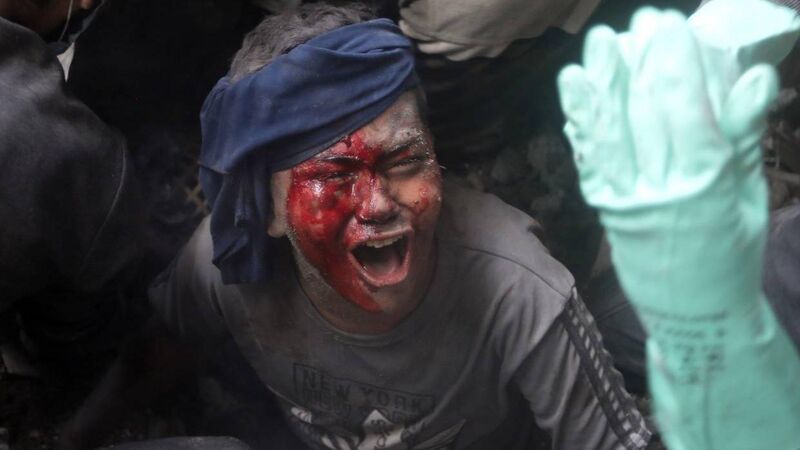The world grieves a celebrity, while war impacts on so many

An injured Palestinian boy is rescued from a destroyed building in Gaza. The war is an affront to our humanity, says Colette Sheridan
Yes, of course you do - or you did when you were younger and more gullible.
Most of us, even the most cynical and critical of celebrity culture, are interested in at least one celeb. But that interest may be fleeting, only expressed when we pause scrolling on social media to read the latest about Victoria Beckham’s smokey eye make-up or diet of steamed fish and veg.
The sane amongst us are not invested in the lives of celebs to the extent that more obsessive types are. Celebs are just part of the wallpaper of our lives, entertaining us, intriguing us, maybe even inspiring us to pursue a particular career.
But it’s when celebs die, particularly before their time (why do so many celebs die young?) that the dedicated fans find themselves grieving in a way that is totally disproportionate to the connection they have to them.
On social media, people were coughing out the usual over-the-top expressions of being ‘gutted’, ‘devastated,’ ‘broken-hearted’ and generally laid-low by Perry’s death.
Yes, it was sad. Yes, he had his demons; at one stage he was reportedly taking 55 pills a day. And to Perry’s credit, he had said: “When I die, I don’t want Friends to be the first thing that’s mentioned. I want (helping people) to be the first thing that’s mentioned, and I’m gonna live the rest of my life proving that.”
This, from a man who estimated he had been in detox 65 times and “escaped death” four years ago after an emergency resulted in him being put in hospital.
But can we please reflect on what is happening in the world away from Tinsel Town, namely the horrific events in Palestine and Israel, and get a grip on where we direct our emotions?
With wall-to-wall coverage of the war, we are in danger of being desensitised.
At first, we are shocked when we see a father carrying his dead or seriously injured child, trying to bury the deceased or desperately seeking medical help. But when we see these scenes every day, they become the norm.
But I can’t forget the image of a one-day-old infant struggling in an incubator and hearing from a doctor that if the electricity is cut off in Gaza, the baby - and many other babies - will die.
Deeply complex though the history may be, there is no excuse for killing civilians.
We should be angrier. But we are, perhaps, quite privileged to be able to indulge in mourning a distant celeb that brought joy to our lives. It’s a lot easier to take on board than the thousands and thousands of dead people in the Middle East.
I would have thought that emoting over the deaths of everyone from Princess Diana to Robin Williams and latterly, Perry, was a bit loopy. But it’s very normal.
According to a report from Ohio State University, celebrity deaths “can hit surprisingly hard”.
Despite never having met the person, you may have formed an emotional attachment to them and their death can be understandably upsetting.
“Not only do many people look up to celebrities and try to emulate their behaviour, we often find ways that we relate to them,” said the report.
“We see things about them in ourselves, and when these celebrities die, we’re not only faced with our own mortality, we lose that ability to relate.”
Perhaps we’ve been through something similar to a favourite celeb, like overcoming addiction.
Matthew Perry, ostensibly, had it all - but he battled addiction and the downside of fame. “Addiction, the big terrible thing, is far too powerful for anyone to defeat alone, but together, one day at a time, we can beat it down,” he wrote in his book.
That reaching out was the mark of someone who understood human nature’s dark side and the importance of not isolating oneself when trying to deal with addiction and depression.
Perry established a sober house to help others in their struggle with addiction. That was a lot more important than entertaining the public in his role as Chandler Bing on Friends.
But it’s for his star turn on telly that we will remember Perry. Such is our need for escapism.
Suffer little children in Gaza.







 App?
App?




